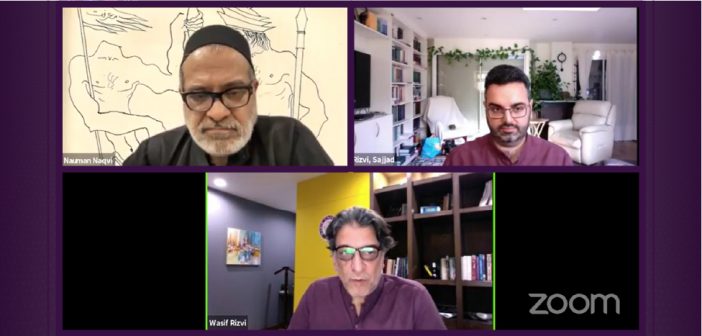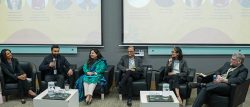Journeys are usually capped by beginnings and ends but what happens when you lose sight of the end, you go astray. This is somewhat the situation humankind finds itself in today with their cognition and sight of the true ends obscured by centuries of colonization.
This was the crux of the fifth and final session of the fourth Post-colonial higher education conference, which focused on ‘Reparative Ends’. The session featured conference chair Dr. Nauman Naqvi, an Associate Professor of Comparative Humanities at Habib University and Dr Sajjad Rizvi, an Associate Professor of Islamic Intellectual History at the University of Exeter. Mr. Wasif Rizvi, President of Habib University, was the chair of the session.
Dr. Nauman Naqvi presented his paper, titled “Repairing Cognition: The ends of Experience”. He said, “the experience of ruins in the midst of plenty has proceeded by leaps and bounds in the time since Bahadur Shah Zafar’s passing.” He further used Agha Ben’s example to illustrate the universality of this unprecedented, extraordinary and cognitively violent, if not ‘epistemicidal experience’ that has now become quotidian and therefore invisible, except in the minor discourses of art on the extreme fringes of bio-political life. This destruction of experience, he explains, has been a virtually universal trope in international literary modernism. Variously, the experience was formed, charted and traced. Within philosophy, it has been articulated by a range of philosophers that the phenomenological movement, in its radicalization by Martin Heidegger, was motivated to return to experience. This was through the experience of the erosion of and alienation of experience.
He argued that our current alienation from experience is so very abysmal that the literate classes fervently believe that they can and will colonize the red object in the night sky – Mars. He went on to say that had experience not been utterly pulverized, it would have been perfectly obvious that no matter how bad things get on earth, they will still be nothing compared to the hellish landscape of Mars.
He emphasized the profound forgetting of and abyssal alienation from one’s own bodily experience. He questioned literate people in their quest to imagine themselves as pure spirits indicated in their self-understanding as the most morally elevated beings in history, virtually pure and innocent moral and spiritual beings. The political manifestations of this bizarre phenomenon are the growth of anti-corruption fascist politics. Those who relatively benefit or thrive in this corrupt world order — means taken for ends, are corrupt in the very forms of life, he argued.
Dr. Naqvi theorized that the primary agency behind this breathtaking alienation of experience is the doctrine of progress. The master concept behind a range of other modern concepts and institutions, such as nationalism, work in tandem to further devastate experience and hence, cognition. Without a sense of finitude and without the cognition of ends, there can be no ends. Our situation is so disastrous that, we are not able to judge and make a distinction between means and ends without ends.
Watch the session
Money, he argued, on the other hands, is not just a means – it is the means of means, “the meanest thing in the world.” To think that it can be an end is not only morally objectionable, it is cognitively disastrous and catastrophic which has reverberating consequences for the entire structure and possibility for experience and cognition. He highlighted, “When genuine ends are treated as a means, where the commercialization of knowledge is everywhere today, knowledge, hence truth and reason can only flourish if it is treated as an end in itself.”
Dr. Sajjad Rizvi argued upon the theology of the future which he explained as representing and reacquainting oneself with the sacred and holy, being aware of their presence and not just empty terms. Messianism, he says, is the quintessence of what we understand as reparative ends. The redeeming of the messiah in the folding of times at the end of days. Messianism is the completion of the providential care of humans and returns to their origins, he argued. The study of Islam is mired in an orientalist obsession with death – of the subject, of God in the inert scripture of the Quran. “Islam is not born by believers but lies in texts which lie entombed in our metropolitan vaults,” he highlighted.
Grief, he examines, is an important aspect of messianic tradition – the commonality of grief that brings us together. Messianism is an apocalyptic look towards the future and overcoming binaries and violence of imposition is in itself a reparative future, it is the narrative of Islam that we have forgotten. If we do not repair that narrative and that vision and that ability to dream, it is precisely the ability to dream about the future and the possible futures that many Muslims in our post-colonial world seem to have lost. The expectation of the arrival of the messiah is the expectation of relief after intense imposition, and this will be the providential eventuality of humans.
Mr. Rizvi went on to say that if we have to deal with epistemicide, we need to repair how we understand messianism – it is the ultimate reparative end. Overcoming violence with peace and justice is reparation.
Mr. Wasif Rizvi, while concluding the session, said that the conference on Decolonial Thought in the Global Ruins “intended to highlight the response to repeatedly raised questions of purpose, objective and of feeling grief and catastrophic loss over the ubiquitous omnicide.”
News Coverage
The Express Tribune





